4기 | Gourmet Diversity at SNU
21-12-16 14:04페이지 정보
작성자 관리자 작성일21-12-16 14:04 조회362회 댓글0건관련링크
본문
Team Gourmet Diversity at SNU
ㅇ Background
- What better way to explore different cultures than by highlighting (and tasting) different types of cuisines from all around the world? Cooking as a family or with friends and loved ones brings us together because we are able to share our culture and heritage through food and give each other nourishment. Coming together and sharing a meal is the most communal and binding thing in almost every place in the world. Food gathering offers an international opportunity to cook meals from all over the world and learn about traditions and manners
- This event is about creating coexistence and social awareness between these different communities through a fun event where students can learn about cultural traditions and manners
ㅇ Purpose
- The main purpose of this activity is to help SNU students realize the impact of the existing diversity on campus. We aim to educate the SNU community about its diversity through a bonding activity. Besides, we want to foster meetings between Korean students with different backgrounds and international students.
- Lastly, we hope this event will enable students to discover cultural traditions and manners from all over the world and enhance open-mindedness among communities.
ㅇ Team member
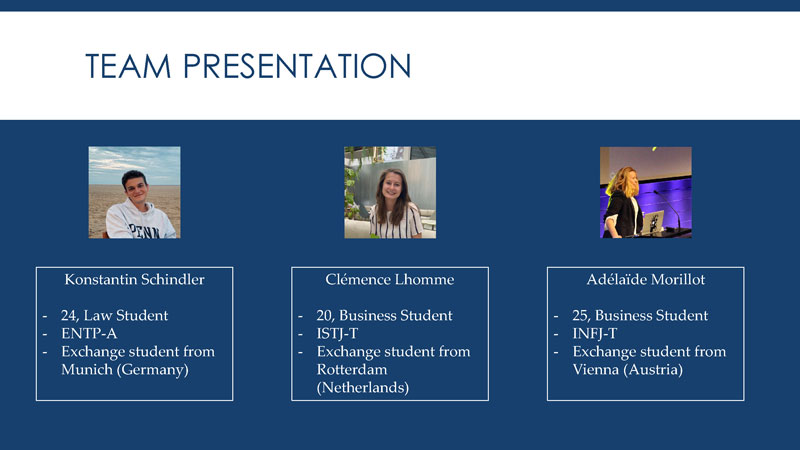
I. Explanation of the concept of the cooking workshop
Based on past events (SNU Top Chef, COOKn association, …), we decided to organize an event linking cultural diversity and cooking. As international students, we experienced cooking classes in Seoul to learn about Korean dishes and enjoyed it a lot, so we decided to repeat this experience so more students can enjoy it and learn about culture diversity at the same time.
Cooking classes are quite common, and the concept is pretty basic: participants pay a fee and meet an instructor who provide them with the ingredients, and they cook together some given dishes.
Applied to the student community and to this internship, we decided to let the participants choose the dishes they were interested in, targeting cultural diversity. Besides, the fees were covered by the Activity budget.
At first, the cooking workshop was supposed to be held by teams on Zoom, in order to comply with the current COVID regulations. However, due to several cancellations, we were able to host the cooking workshop at our place, which provided a better experience to the participants, as they could meet together, learn from different cooking culture and table manners while cooking dishes from a different country.
II. Outcomes of the cooking workshop
1. Cultural outcomes
First of all, this activity brought students from different cultures together (8 different nationalities from 3 continents). Participants were able to talk freely about their own culture, their national dishes and how important food can be part of their identity. As we can see, hosting this event offline first managed to bring participants from different culture and backgrounds together and start discussion on food culture.
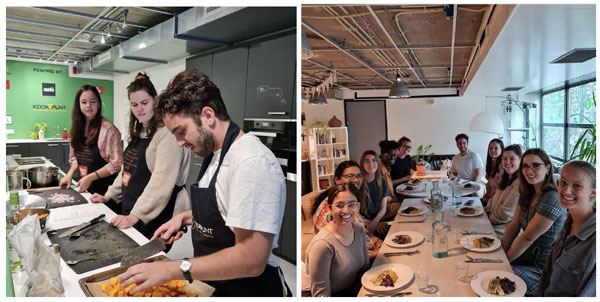 Second, this cooking workshop taught the participants about French culture and French cuisine, as the dishes chosen were Ratatouille and Crêpes, both French recipes. Indeed, most participants never had the chance to taste Ratatouille, nor cook crêpes. This event also had an educational purpose as the participants were able to learn new recipes.
Second, this cooking workshop taught the participants about French culture and French cuisine, as the dishes chosen were Ratatouille and Crêpes, both French recipes. Indeed, most participants never had the chance to taste Ratatouille, nor cook crêpes. This event also had an educational purpose as the participants were able to learn new recipes.Third, as the event was held offline, we were able to show the authentic experience of French get together meals. Indeed, the fact of meeting to share a meal and (a few) drinks is considered part of the French culture, as it is part of the UNESCO Intangible Cultural Heritage. We thus took the opportunity to explain a bit about French gatherings with a glass of (French) wine.
2. Community outcomes
This event was able to get some participants from very different backgrounds and cultures together, which was definitely an asset for the SNU Community. Besides, the fact that the event was held offline also allowed interesting discussions about the different manners and life in South Korea from a foreigner perspective.
III. Activities
1. Delivering information: social media through the existing SNU Diversity council account
o We first planned to conduct an Instagram campaign from 20th Oct to 11 Nov, to inform SNU students about the different cooking traditions existing within the SNU community. We planned to hold some quizzes about food and table manners, some interesting facts about food around the world, some inspirational foodies accounts, …
o We conducted an Instagram campaign from the 22nd of October to the 8th of November, by posting mainly in stories some fun facts and quizzes about world gastronomy, and food as a cultural asset. Overall, we managed to reach around 30 persons per stories, with 10 to 16 persons who actively engaged with our content. Our post regarding the event reached 75 accounts and interacted with 10 persons.
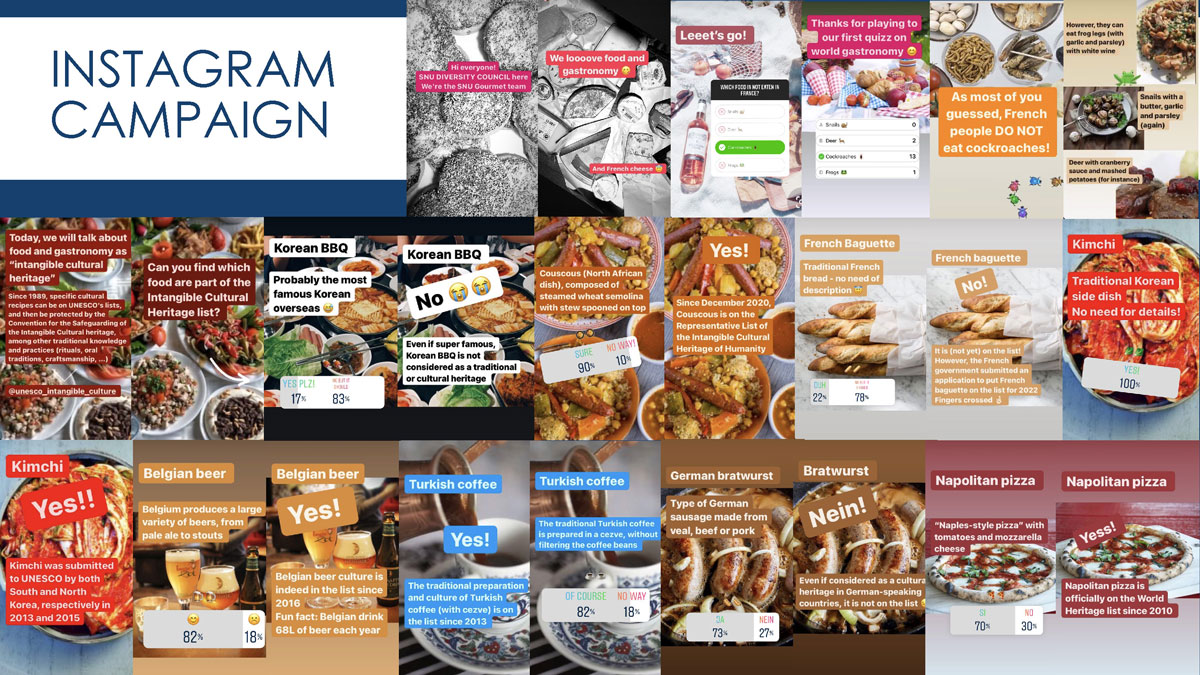
o Overall, even if the Instagram campaign was not as intense as we planned it, it managed to reach some SNU Students who shared their knowledge on food cultural heritage. For further research, we could advise organizers to be more present on the social networks, to provide more contents, but also to increase the number of followers and engagement on the page itself.
2. Cooking workshop: breaking the barriers of diversity
o We first created and shared a google form where people could sign up, choose the dishes they were interested in, and share their first impression about the importance of food as a cultural component. Then, according to the majority of votes, we decided to cook Ratatouille (a French dish), with crêpes (a French dessert). As the number of people who subscribed to the event was quite low (12 registered), we decided to buy some French wine as well, since all the dishes were French, and it is part of the French culture as well.
Moreover, the day before the event, a few people cancelled, and we were 10 overall. We then decided to host the event at our place and invite the participants directly, since it wouldn’t go against the COVID regulations. Indeed, food is an important component of French culture, and “the gastronomic meal of the French” is part of UNESCO intangible culture heritage, which is the act of meeting together to share a long meal and a few drinks. We assumed that the experience for the participants would thus be more authentic.
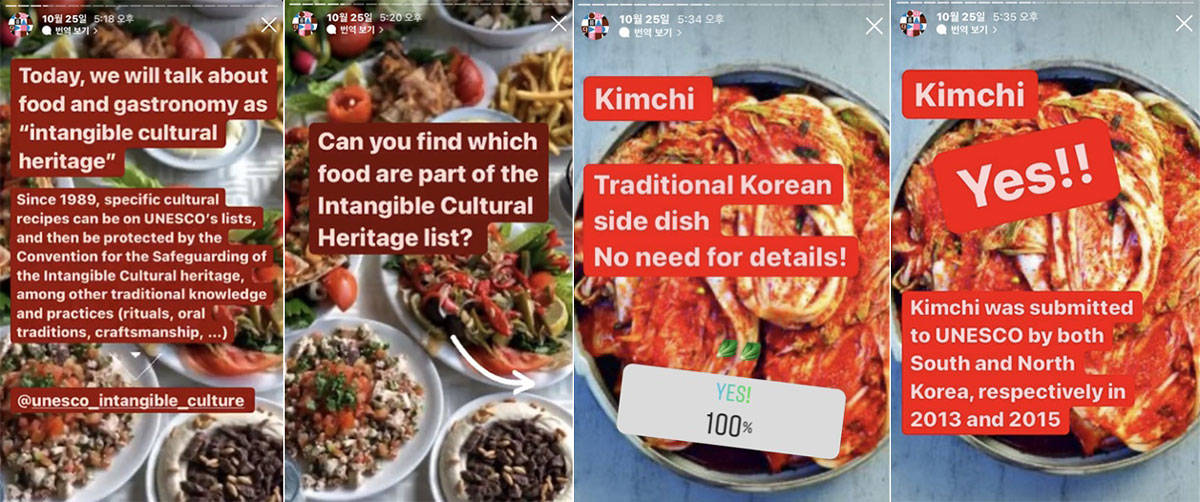 We first cooked altogether the Ratatouille and then told the participants about the dish itself (the origins, where it comes from in France, when do we eat it, and its different rituals), while sharing a glass of (French) wine. Then we taught the participants about crêpes, how to cook them, and most importantly how to flip them! Every participant got the chance to try to flip them and eat the crepe with the topping of their choice.
We first cooked altogether the Ratatouille and then told the participants about the dish itself (the origins, where it comes from in France, when do we eat it, and its different rituals), while sharing a glass of (French) wine. Then we taught the participants about crêpes, how to cook them, and most importantly how to flip them! Every participant got the chance to try to flip them and eat the crepe with the topping of their choice. During the event, we also asked the participants to fill a second form.
Finally, as the activity was held on the 11.11, we offered each participant a pack of Pepero, and the Korean participants explained to us the origin of this tradition.
Ⅳ. Conclusion and Suggestion
1. Outcomes
o We first realized that peoples from very different background were interested in the cooking workshop, which shows the importance of cooking as part of a cultural identity. People enjoyed learning new recipes, but most importantly learning about the culture linked to these recipes and how important it was for the students teaching them.
o Second, we realized two surveys for the participants to get to know their opinions on food culture, food itself, and what place food culture and manners takes for them.
Here are the main results from the first survey we conducted (before the event):
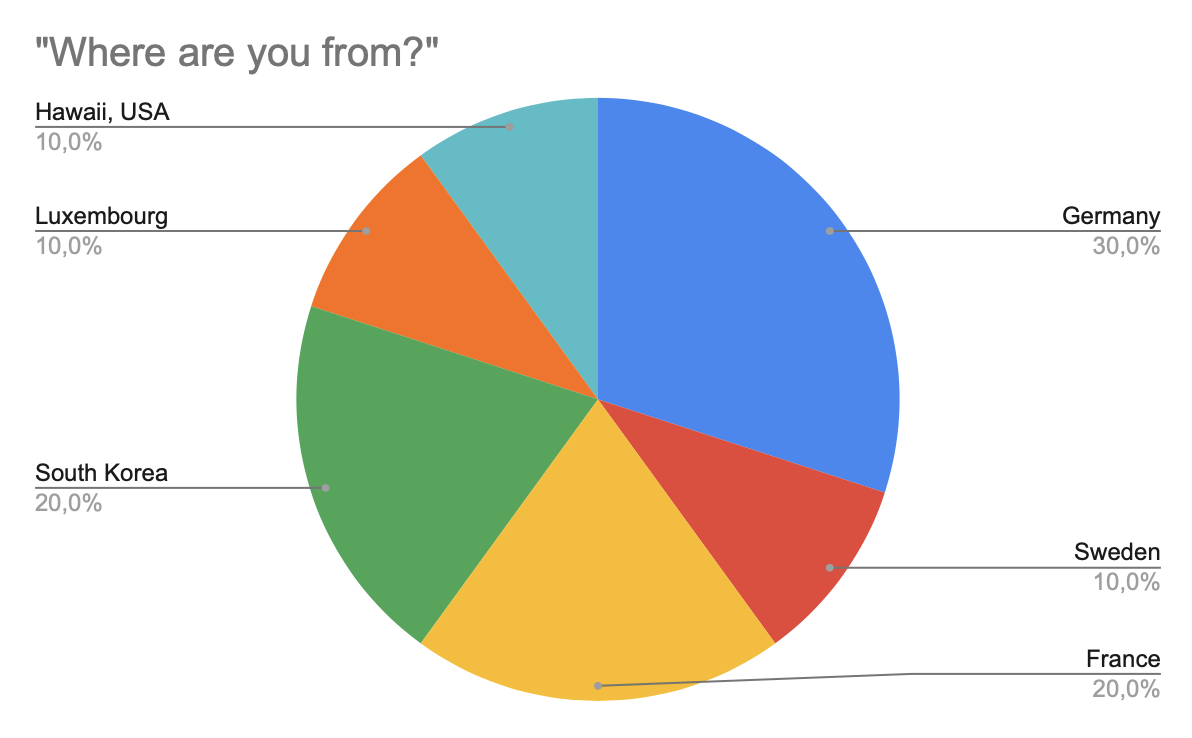
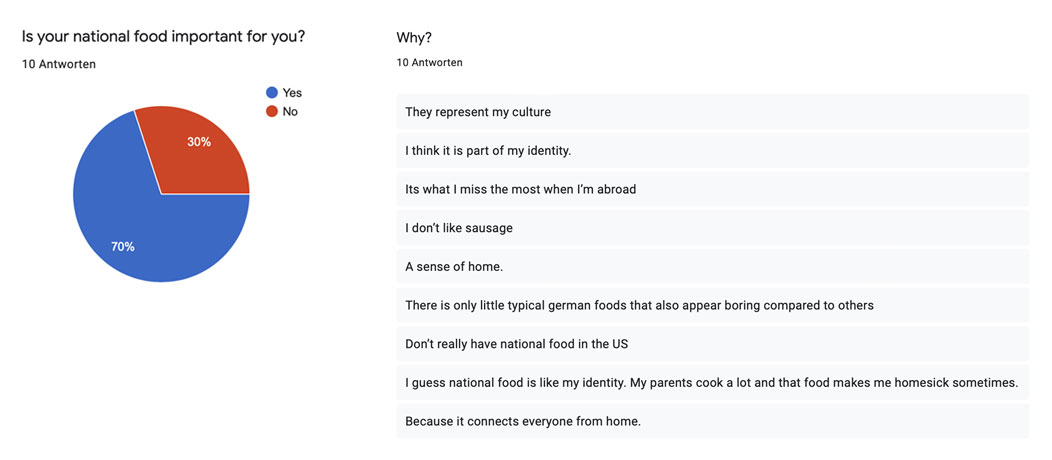
Then, we conducted a second survey with the participants during the event to see if there were an evolution of their thoughts and evaluate the impact of our event.
Overall, we can see that the activity taught the participants about food diversity and culture, as well as table manners from all over the world. Besides, people learnt about new cultures as well.
Ⅴ. Activity Reviews and Opinions
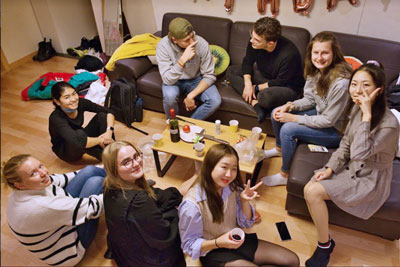 First, from a planning perspective, the event was a success. Even if not as many people as wanted showed up, we managed to provide a qualitative event, so that the participants were satisfied and learnt new recipes.
First, from a planning perspective, the event was a success. Even if not as many people as wanted showed up, we managed to provide a qualitative event, so that the participants were satisfied and learnt new recipes. Second, holding the event offline instead of on Zoom was a better solution, since people were able to meet with more diverse culture and exchange, which would not have been possible online.
Third, we were a bit too enthusiastic regarding the proportion and the number of participants. Indeed, we experienced last-minute cancellation from participants, for which we already bought the ingredients.
Finally, we were a bit disappointed to notice that no one from the DIVERSITY Internship participated in this activity. We think it might be because we shared the information regarding the event rather late.
To conclude this activity, here are a few pictures taken during the event:
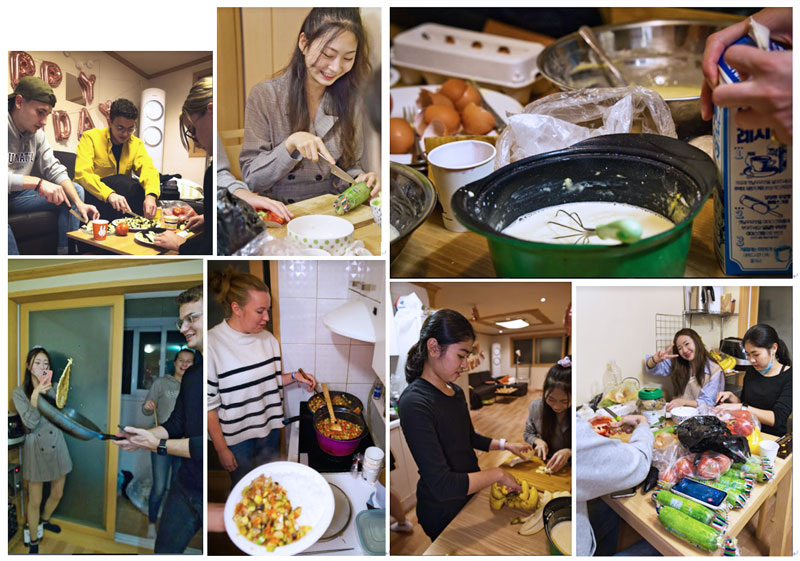
댓글목록
등록된 댓글이 없습니다.